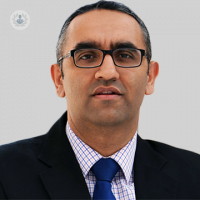Phimosis: how to treat a tight foreskin in adults
Written in association with:Tight foreskin in adults can be extremely uncomfortable, and in some cases leads to severe pain, irritation and infection. Expert consultant urologist Mr Rajesh Kavia describes this condition in greater detail, from causes and symptoms to complications and treatments.

What is phimosis and what causes it?
Phimosis is a tight foreskin that cannot be retracted fully and comfortably below the glans. It can occur both in the flaccid state or be tight with erections. If the foreskin does retract and then become stuck this is called ‘paraphimosis’.
When does phimosis become a problem in men?
Phimosis can be a problem for men if it results in pain, discomfort, irritation or infections.
Pain may occur during intercourse when the foreskin cannot retract back, this can also lead to the skin splitting which can be a cause of irritation. If patients are unable to clean the glans infections, known as balanitis, can occur. There are other forms of inflammatory conditions which also cause balanitis. Phimosis is common in men with diabetes and is related to a condition called lichen sclerosis et atrophicus (Also known as Balanitis Xerotica Obliterans – BXO).
Can serious complications occur if it's left untreated?
Recurrent infections and pain are the most common complication. If the condition is due to BXO then there are risks of significant scarring and closure or stenosis of the urethral meatus (the opening at the tip of the penis), which can cause issues with the flow of urine. Very rarely tight inflamed foreskins can be related to cancers of the penis.
What non-surgical options are there?
If the foreskin is mildly tight daily retraction and sometimes steroid creams can be helpful. If one is treating an infection, antibiotics or antifungal creams are used.
What surgical options are available?
The options for surgery depend on the cause and the surgeon will be able to discuss this with you, but generally if the foreskin is healthy but tight, then a frenuloplasty or perputioplasty could be considered. Both of these procedures aim to preserve the foreskin while loosening the skin to allow retraction. These carry less risk in terms of cosmetic or sensory change.
The other option is a circumcision – where the whole skin is removed and then the skin edges sutured together. The risks of surgery are infection, bleeding, pain for a few days, cosmetic dissatisfaction and sensory change. The operation can be done under local or general anaesthetic depending on the patient's preferences.
After circumcision, is foreskin restoration possible?
This is difficult if the skin has been excised, though there are devices on sale claiming to restore the foreskin. However, the evidence of these devices actually working is limited.
If you’d like to discuss this or any other urological issue with an expert, you can visit Mr Kavia’s Top Doctors profile and request an appointment.


